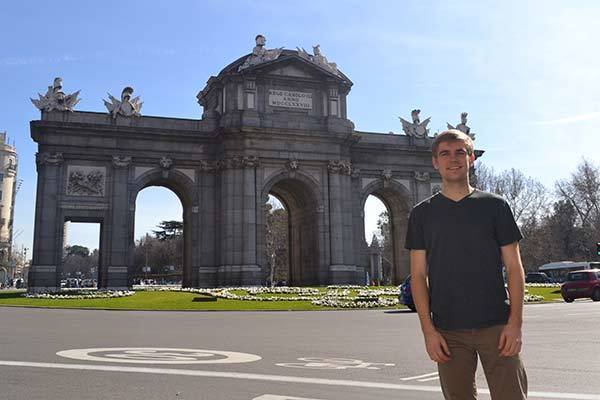
Ryan Schultheis ('15), a double-major in Political Science and International Economics, recently received a Fulbright English Teaching Assistantship in Mexico! Here at the Nanovic Institute, we like to think that we helped prepare him for the application process and for the experience. We gave Ryan a Senior Travel and Research Grant to travel to Madrid and Barcelona over spring break to conduct interviews for his senior thesis. The practice in application-writing, the international experience, and the intense exposure to Spanish that he received as a result of his Nanovic grant experience certainly had an impact on his Fulbright application. Here you can read all about his trip to Spain in his own words!
I am grateful for the Nanovic Institute’s Senior Travel and Research Grant to fund my intellectual and cultural adventure in Spain. Without the grant, I would not have had one of the most transformative experiences of my undergraduate career. From intellectual challenge (and confidence!) to cultural exchange, my journey through Spain served to reinforce the skills and mindset that I have come to develop during my time at Notre Dame. Indeed, my first journey to Europe was fruitful in many ways.
First, I completed necessary and challenging interviews for my senior thesis, a project which analyzes Spanish administrative reform as it impacts the adjudication of a recent surge in the number of immigrants seeking to naturalize in the country. I had never been so challenged to communicate complex thoughts and ideas in Spanish, an experience that has provided a renewed and important sense of confidence in my language skills. The individuals that I interviewed welcomed me to their country and culture, eager to learn and discuss my project. I completed seven interviews in total – three in Madrid and four in Barcelona. Engaging both academics and attorneys, I explored the nuances of my topic in university offices, neighborhood legal clinics, and Spanish cafés.
In Madrid, my first interview took place at the Fundación Ortega y Gasset, a complicated metro ride for a new, yet aspiring madrileño. As with most of my interviews, I entered intimidated, yet left with a profound sense of confidence in my understanding of a complicated and under-theorized policy change. While the interviews were structured in design, I was required to listen and critically respond (in Spanish!) to unanticipated areas of insight. Listening to recordings of the interviews in my hostel, I was able to improve my questioning with each consecutive interview. Nearly all of the individuals that I spoke with have sent follow-up e-mails, eager to provide additional reading materials, references, and support should I wish to publish my completed work. The interviews were both productive and entertaining. In Barcelona, Gemma Pinyol, an academic and former director of the Gabinete de la Secretaría de Estado de Inmigración y Emigración not only offered unique insight into the Ministry of Justice’s motivation for proposing unprecedented fees in the naturalization process, but also bought my café con leche, determined to ‘break the stereotype that Catalonians are stingy’. Following my interview with Imma Matta from Cáritas - Diocese of Barcelona, we spoke about her career and my interest in immigration law. Indeed, I could not be more grateful for the intellectual generosity and kindness of my interviewees.
While not performing research, I utilized my free time to explore the cultural richness of Madrid and Barcelona. While visiting the Museo del Prado and Reina Sofia in Madrid, I made immediate (and unexpected!) connections to works that I have analyzed and pondered in Spanish literature courses at Notre Dame: Las Meninas by Velázquez to Guernica by Picasso. During an open evening in Madrid, I attended an ópera at the Teatro Real, immersed in the beautiful exposition of Gabriel Garcia Lorca’s El Público. In Barcelona, I visited Gaudí’s Basílica de la Sagrada Familia, stunned by both the beauty and peace that surrounded me. I left Spain eager to return and explore the country even more, and I will. This summer I will spend 5 weeks walking and writing on the Camino de Santiago, beginning in southern France and arriving in Santiago de Compostela (500 kilometers!).
Thank you, Nanovic Institute, for helping me to achieve my intellectual goals while opening my eyes to a people and culture that I will continue to engage following graduation!